Five Harvard students selected as 2003 Rhodes Scholars :
Will use prestigious scholarships to study at Oxford
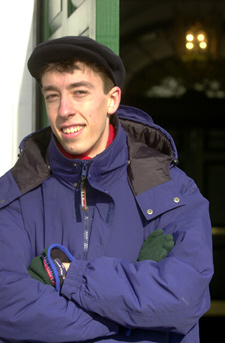
Thinking outside the box seems to have given Harvard students the edge in the Rhodes Scholarship competition this year. Four Harvard College students and one from the Medical School received the prestigious award – more than from any other school. All of them are pursuing academic careers that are interdisciplinary and unconventional.
The four winners from the College are Jeremy England ’03, Sue Meng ’03, Anna Weiss ’03, and Lindsey Worth ’02. The winner from the Medical School is also Harvard’s only Canadian Rhodes Scholar – Amar Dhand, a 2001 Dartmouth College graduate from Saskatoon, Saskatchewan.
The Rhodes Scholarships were created in 1902 by the will of British philanthropist Cecil Rhodes. Criteria for selection include high academic achievement, integrity of character, a spirit of unselfishness, respect for others, potential for leadership, and physical vigor.
Jeremy England has been studying biochemistry and has worked with Professor of Chemistry and Chemical Biology Eugene Shakhnovich on the theoretical modeling of protein designability. England has made original discoveries about the properties that make proteins more or less designable. He and Shakhnovich have co-authored a paper on the subject that has been submitted to Physical Review Letters.
Not content with conducting original research on the frontiers of biochemistry, however, England has also taken advanced courses in physics, and during his stay at Oxford University plans to work toward a doctorate in theoretical condensed matter physics. Ultimately, he hopes to combine physics and biochem.
“There’s been a lot of work on how different components of the cell interact, but the question of how thousands of different proteins and bio-machinery act all at once is largely unexplored. I believe that theoretical approaches from the realm of physics, such as statistical mechanics, may be useful in understanding how biological systems operate.”
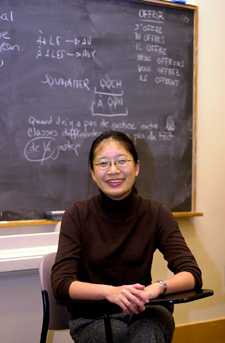
A native of Durham, N.H., England plays the violin and has performed in chamber music groups during his undergraduate years. “There are so many Harvard students who are more accomplished violinists than I am,” he says modestly. “It’s something I do to relax and have fun.”
His forays into acting have been undertaken with a similar aim. His roles have included Florizel, Prince of Bohemia, in “A Winter’s Tale” and a serial murderer in “The Interview.”
Meng was born in China and came to this country when she was 5. She and her mother, a survivor of the Chinese Cultural Revolution, settled in New York City. She still remembers the panic she felt on her first days in school when teachers and fellow students spoke to her in an incomprehensible foreign language.
Now an aspiring writer and literary scholar with a special interest in the Victorian novelist George Eliot, Meng often reflects on the unexpected turn her life took.
“It’s funny that I should now want to devote my life to the study of English when it was once so foreign to me.”
Meng is the only Harvard student this year to win both a Rhodes and a Marshall Scholarship. She has given up the Marshall so that it could be awarded to the next qualified candidate.
A history and literature concentrator, Meng read Eliot’s novel “Middlemarch” in her freshman year and “totally fell in love with it.” The experience proved a crucial one in shaping her academic career, steering her in the direction of the Victorian writers and their world.
“I’m very passionate about their work,” she said. “I love how completely interdisciplinary they were. Science and art weren’t as separate as they are today. The Victorians had a vision of how literature could contribute to the social good and still have aesthetic value.”
Meng has tried to embody that vision in her own writing, tackling a great variety of subjects in her editorial column in the Harvard Crimson and in her work on Historia, an undergraduate journal for history and literature concentrators, which she co-founded and helps to edit.
“In history and literature, so much happens in small tutorials that students don’t get to learn much about each other’s work. This is a great way to share our research.”
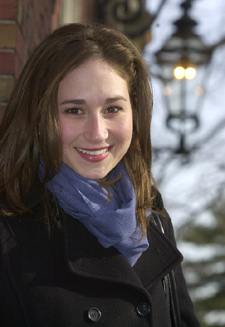
Meng has written for several professional publications, including a story for Forbes Magazine on wealthy people and their pets. At Oxford she plans to pursue an M.Phil. on the idea of sympathy in the writings of Eliot, Ruskin, and Arnold.
Weiss is another Rhodes winner who has brought together seemingly disparate elements into a balanced and coordinated whole. Perhaps it was her early training in classical dance that helped her achieve this graceful synthesis.
“I started dancing when every other little girl starts taking ballet, at around 6,” she said. “I guess I just believed more than most in the reality of swan queens and fairy princesses, and so I stuck with it!”
A native of New Rochelle, N.Y., Weiss studied with a series of Russian dance teachers who not only instilled in her the ideals and discipline of the Russian ballet tradition, but an appreciation for Russian culture in general. This early exposure led her to concentrate in history and literature at Harvard with an emphasis on Russian language and culture.
Her academic interest in things Russian led Weiss to seek hands-on experience in Russian-U.S. relations in the form of an internship with the Carnegie Endowment for International Peace in Moscow. Weiss worked with policy analysts, military experts, and diplomats, editing and translating working papers for distribution to members of the Russian Duma and the U.S. Congress.
“Living in Russia was an amazing experience,” she said. “Seeing firsthand the places that had inspired the literature and art with which I had fallen in love in the U.S. was certainly thrilling. It was also a sobering experience which put into perspective so much of what we in the United States take for granted.”
Weiss’ travels have also taken her to Wicklow, Ireland, where she worked at the Glencree Center for Reconciliation, which brings together Catholic and Protestant teenagers from Northern Irish towns to learn about the history of the conflict in Northern Ireland and how to resolve it.
She has continued her involvement with dance, serving as director of the Harvard-Radcliffe Ballet Company, a troupe of 35 undergraduates who perform in biannual productions.
At Oxford she plans to work toward an M.Phil. in international relations, specializing in relations between the United States and the former Soviet Union.
Worth is another student who has found a way to unite two separate interests into a single inspiring career goal. A philosophy concentrator who plans to attend law school with the eventual aim of becoming a federal judge, Worth believes that the analytical training she received in philosophy can be of enormous value in making legal decisions.
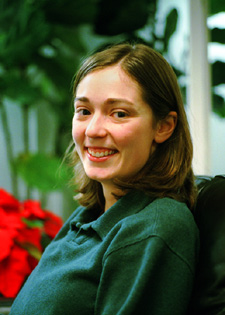
A West Virginian currently working in the U.S. Attorney’s office in Boston, Worth looks forward to studying the philosophy of law at Oxford. Afterward, she plans to return to the United States and earn a law degree.
Worth said that it was Professor of Government Michael Sandel’s Core course, “Justice,” that piqued her interest in ethical theory and prompted her to become a philosophy concentrator. Grappling with thinkers such as Kant led her to consider seriously the effect that philosophy can have on political and legal decision making. Her honors thesis on Kant’s ethical theory received the Carrier Prize for the best thesis in political and moral philosophy.
As an undergraduate, Worth took on summer employment at the Office of the Solicitor General in the U.S. Department of Justice, the District of Maryland U.S. Attorney’s Office, and as a Congressional intern in the U.S. House of Representatives. She has also competed successfully in the Harvard Debating Championships and performed as a featured soloist in the Flute Ensemble.
Worth believes that the analytic abilities she has honed as a philosophy concentrator will qualify her to make reasoned and socially enlightened decisions as a judge, perhaps some day serving on the U.S. Supreme Court.
“That’s my dream,” she said.
Now in his second year of medical school, Dhand plans to spend his time at Oxford working toward a graduate degree in education. After returning to the United States, he will complete his medical studies.
The reasoning behind this academic detour stems from Dhand’s experience developing an HIV/AIDS peer education model in Vietnam.
“In developing countries, much of the healing must be done through prevention because the resources simply aren’t available to treat diseases with drugs. In many parts of the world, education is medicine.”
Dhand grew up in Saskatoon, Saskatchewan. His father brought the family there from India to take a job teaching at the local high school. He later earned his Ph.D. in education at the University of Montana and now teaches curriculum development at the University of Saskatchewan. Dhand’s mother is an art teacher and practicing artist.
As an undergraduate at Dartmouth, Dhand followed a pre-med program, but gave it an original slant. He wanted to study neuroscience, but since Dartmouth had no established undergraduate program in that area, he made up his own program.
Following his conviction that a college education should be multidisciplinary with an emphasis on the liberal arts, Dhand minored in English literature, with an emphasis on the English Romantic poets.
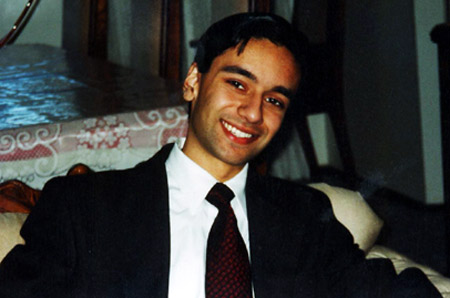
“When you do pre-med, you don’t have a lot of extra time, but poetry is a particular passion of mine, and I always wanted to keep that sacred.”




